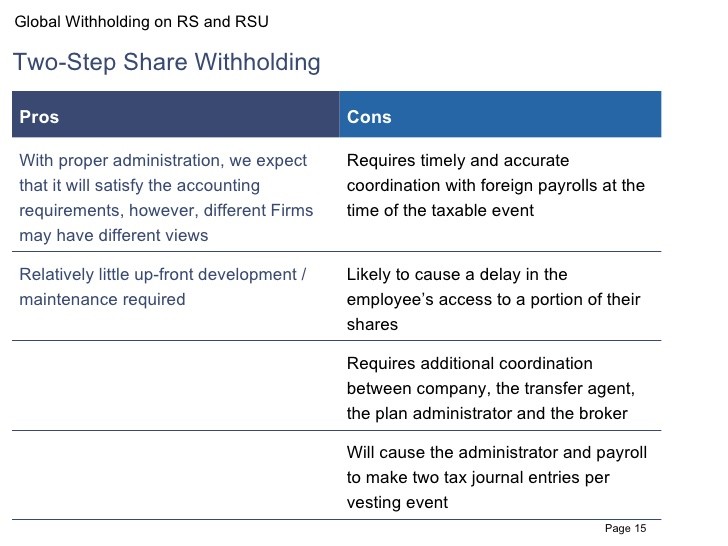Tax Treatment of Restricted Stock Unit (RSU) Benefits
Post on: 28 Май, 2015 No Comment

If you work for a large company, chances are Employee Stock Option benefits (ESOPs) have been replaced with Restricted Stock Units (RSUs). There are significant differences between tax treatment of ESOPs and RSUs. In this post, we will look at how RSUs are taxed for Canadian residents. Restricted Stock Units are simply a promise to issue stock at some future vesting date(s) provided some condition(s) (often just being an employee of the company on the vesting date) are met. It is important here to distinguish RSUs from Restricted Stock Awards (RSAs). RSAs are stock grants in which employees may not sell or transfer the shares until they vest but are entitled to dividend payments. RSAs are unpopular in Canada due to their tax treatment: the FMV of the the RSA grant is taxed as employment income at grant but employees will receive the cash from the sale after the grants vest, which may be many years later.
Like stock options, there are no tax implications when RSUs are granted to an employee. At the time of vesting, the FMV of the RSU grants that vested is considered as employment income. Starting in 2011, the Canada Revenue Agency requires employers to withhold taxes on employee stock benefits, including RSUs. Therefore, your employer will likely sell a portion of vested restricted stock and remit it to the CRA. The FMV of restricted stock and taxes withheld will be added to the Employment Income (Line 101) and Income Tax Deducted (Line 437) of the T4 slip for the financial year.
The employee has to keep track of restricted stock FMV at the time of vesting. If there are multiple vesting events, the adjusted cost base of the stock must be calculated. When the stocks are eventually sold, the difference between the proceeds of the sale and the adjusted cost base of the shares should be reported in Schedule 3 Capital Gains (or Losses).
Let’s take an example. Sue works for ABC Corp. and was awarded 300 RSUs on May 1, 2011. ⅙th of the award will vest every 6 months provided Sue is employed on the vesting date. Sue’s first batch of 50 units of restricted stock vested on November 1, 2011. ABC was trading at $10 and Sue’s employer sold 23 shares and remitted the withholding tax to CRA. Sue’s second batch of 50 units of restricted stock vested on May 1, 2012. ABC was trading at $12 and Sue’s employer again sold 23 shares and remitted the withholding tax to CRA. In both cases, her employer included $500 and $600 in employment income and $230 and $276 in income tax deducted in Sue’s T4 for 2011 and 2012 respectively. Note that, unlike stock options which are eligible for the stock option deduction and hence are taxed at 50 percent, there is no favourable tax treatment accorded to RSUs.
On May 15, 2012, ABC hit $15 and Sue sold the 54 shares of ABC Corp. that she holds. Sue’s adjusted cost base is $11 (27 shares acquired at $10 and 27 shares acquired at $12). Since she sold for $15, her capital gains are $216, which she would declare when filing her 2012 tax return in Schedule 3.














